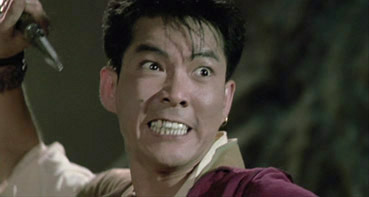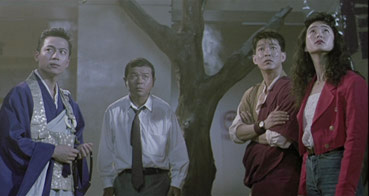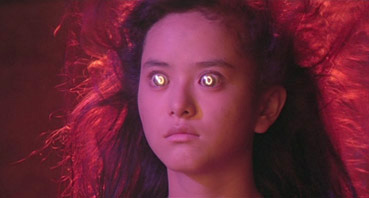| |
"The film is more like an anime. It's more a film for kids. I don't think adults
would like this film. Anyone who
can think won't like the film." |
| |
Yuen
Biao, talking about The Peacock King |
And
he starred in it. You can see where the venerable Biao coming
from, but he's being a bit harsh and is not
taking into account the curious but very real appeal of
the energetically cheesy. This aspect has certainly been
recognised by the UK publicists, who are enthusiastically
promoting The Peacock King [Kujaku ô] less on its action credentials
than on its mish-mash of effects styles and sense of fun.
Nonetheless, Biao does have a point...
Say
what you like about Hong Kong actioners, but whatever the
age of their target audience, they don't hang around. If there's
a down side to this it's that precious little time is put aside to
shape and build characters, which is doubtless why so many of them are sketched in such broad terms. Take the
opening of The Peacock King as an example.
We're just 32 seconds in when the film's primary
villain Raga – who is formally known as Hell's Witch – appears and
announces that the King of Hell is soon to rise and that
darkness will reign, presumably as a direct result. Her
impromptu audience reacts by opening fire on her with machine
guns. I'm not sure why they respond so violently ("This
is private property!" barks the boss fellah, but still...),
or indeed who they are or what they are doing here. It looks
like either an archaeological dig, or maybe a film set, or some
sort of illegal something-or-other, but this is another
casualty to the perceived need to get the plot moving as
fast as possible. A minute later and the earth has given
birth to Ashura, aka Hell's Virgin, who immediately launches
a set of fireballs into a handily parked group of trucks.
Three times. Suddenly the film slows down and repeats itself
so that we can properly appreciate just how much money was
spent on the pyrotechnics. And we haven't even reached the
opening credits yet.

Introduced almost as briskly is cheery Tibetan monk Peacock,
whose master receives a supernatural message telling him
all about the Hell's Virgin. She's apparently due to open the second
Gate to Hell over in Tokyo (how they work this stuff out remains a mystery), to where Peacock immediately heads.
He's not the only one. Over in Japan, Buddhist monk Jiku
Ajari and his disciple Lucky Fruit realise that if all four
Gates of Hell are opened then the King of Hell will escape
and go on an apocalyptic rampage. It's at
the location of the second Gate that loveable rogue
Peacock and the more serious minded Lucky Fruit meet and
team up. Dragged along for the ride is Miss Okada, a junior
manager at the department store in which Raga has chosen
to wreak her particular and colourful brand of havoc.
By
this point you'll be quite aware that this is not meant
to be taken that seriously. If Peacock's joshing around
hasn't clued you in then his bash-it-in-the-head fight with
a satanically animated dinosaur exhibit certainly should.
And then there's the dialogue, which occasionally breaks
off from the functional to wink at the audience. "You
may get a part in a Sammo Hung or Jackie Chan film with
those lines" Miss Okada tells Lucky Fruit after he
has earnestly tried to explain the danger the museum is
in. Later a ghostly noise startles her. "What was that?"
she asks. "Surround sound," Peacock replies.
This
cheery approach does help the sympathetic to swallow a host of borrowings
from other sources, with Peacock and Lucky Fruit coming
off like spiritual Ghostbusters, ink-in-water
cloud effects lifted from Close Encounters,
a corridor of corpses nicked from Raiders of the
Lost Ark, and the fourth Gate of Hell designed
by someone who has been overdosing on H.R. Giger's work
on Alien. There's even an emerge-from-the-smoke
shot I swear is lifted from the end of The Right
Stuff, and a later plot twist that recalls the
moment that I really gave up on the original Star
Wars trilogy. But I won't spoil it for those who
delight in that sort of thing.
The
two monks are the familiar mismatched pair who learn to
like each other and appreciate their differing skills. While
Peacock likes to leap in with fists and feet flying, Lucky
Fruit can do pretty much anything with nothing more than a quick prayer, from
changing the meter of a crooked taxi driver to launching
cheap optical effects at the enemy. He does this a LOT.
If he needs a really big wallop then Peacock joins in
too, something that really comes in useful in the cilmactic scene and
makes you wonder why they were so worried about the prospect
of the fourth Hell Gate opening.

Narrative
development is a sometimes odd combination of the expected
and the peculiar, as an army of devil-worshipping warriors
are introduced thirty minutes in, then ignored until
the climax, when they reappear to provide the monks with mortal foes to punch
and kick. Probably oddest sequence is
the pair's head-on battle with Raga, who responds to their attack by messily
transforming into an almost comically executed claymation
monster, which violently dispatches two background characters
who seem to have been introduced solely to serve as
victims. By then, Peacock has worked out (again, we're not
sure how) that Ashura is actually a sweet innocent under
Raga's control and is worthy of salvation. It's kind of
inevitable that this soft-heartedness eventually blows up
in everyone's face.
Demonic
characters follow the mythological movie standard of
bestial-looking males and gothic sex-bomb females. Mind
you, there is only one male demon and that's the King of
Hell himself, a huge disappointment after ludicrously long
build-up (just how many times do we need to see the same
four shots of the Hell Gate walls rising from the ground?),
a giant ugly bronze dude whose size, appearance
and process work reminded me of the Genie from Korda's The
Thief of Bagdad.
It's
engagingly daffy but insubstantial stuff that is likely
to have as much trouble finding an audience in the UK, much as
it did on its original Hong Kong release and for similar
reasons. Although stylistically pitched at younger viewers,
its sometimes bloody violence has earned it a 15 certificate
and would likely have uninformed parents scrabbling madly
for the remote control. As Biao himself says in the accompanying
interview when remarking on its Hong Kong classification,
"It's a kids' film and yet 'not suitable for children.'"
A
mention should go to the dialogue, which along with pretty
much every Hong Kong action film of the period was
all post-dubbed. Although this works fine for the most part,
it's a little distracting in the Japanese sequences, especially
given that Lucky Fruit's sifu is played by none
other than the great Ken Ogata, whose distinctive delivery
has been mismatched by an altogether squeakier Chinese voice
artist.
Hong
Kong Legends have once again done a sterling job in presenting
the film for DVD, with colour, contrast and detail all generally
impressive. A couple of the interiors are a little lacking
in punch (notably a grey-looking press room), but this is
likely to be down to the restrictions of location lighting.
As ever, the print is virtually spotless and free of damage.
The framing is 1.85:1 and the picture is anamorphically
enhanced.

There
are three mixes here, Cantonese mono 2.0, Cantonese 5.1
and English 5.1. Given my comments above about the Cantonese
post-dubbing, it's hard to wade in too hard on the English
dub, although it still suffers from an excess of over-dramatic
spaghetti western delivery. The 5.1 Cantonese track is a
nicer mix than the original mono and boasts solid use of
the lower frequencies when required, plus the odd bit of
nifty rear speaker work. The English 5.1 mix at first sounds
fuller than the Cantonese one, but soon reveals itself to
be one of those random remixes in which dialogue inexplicably
emerges from rear speakers even though it is being delivered in
front of you. In addition there seems to be a peculiar but
very distinct bias towards the left of the sound stage.
Yuen
Biao on 'Peacock King' (12:01) sees a somewhat
cynical Yuen Biao spending a disproportionate amount of
the interview having a go at the film's Japanese input and
audience, and is somewhat dismissive of his co-star Hiroshi
Mikami for taking the whole thing too seriously and not
socialising on set. He remains indifferent to the film itself,
and feels it was "too Japanese for Hong Kong Tastes."
I
can't help feeling that Yuen Biao on 'Zu Warriors'
(9:13) belongs on Contender's Zu Warriors
disc rather than here, but its been four years since that
was released and as they had Biao in the chair it was obviously
an opportunity not to be passed up. It does give him the
chance to have another brief dig at the Japanese, this time
in the shape of their top effects man, from whom they learned
nothing, apparently. This does lead to some revealing information
about the film's low tech effects, with the filmmakers improvising
after watching the effects on other movies, mainly Richard
Donner's Superman. He's also surprisingly
frank about his views on director Tsui Hark, whom he suggests
is fond of blaming others when things go wrong, and whose
change-your-mind working methods would ensure that he "wouldn't
survive abroad."
Fantasy Comes to Life is a bit of a con, not
an extra feature at all but a promo for four other Contender
releases, consisting of a short extract from each: there's
a very silly Street Fighter-inspired fight from Jackie Chan's
City Hunter (2:14); a stylistic mess of
a punch-up from Avenging Fist (2:23), which is supposedly
the 'unofficial' Tekken movie; a choice clip from the aforementioned Zu Warriors (2:23); and a dull montage
of clips and behind-the-scenes footage from the upcoming
Initial D: Drift Racer (2:02).
Also
on board are the Original Theatrical Trailer
(3:17) and the UK Promotional Trailer
(1:13), the latter of which is voiced by an English Trailer
Voice Man with lots of bass.
Silly
and derivative but also energetic and rather likeable, The
Peacock King is a curious beast that is at times
almost odd enough to attain cult status. Raga's claymation
transformation is almost dotty enough alone to make this disc worth
hiring, at least for the more forgiving genre fans. It's
certainly well presented by Hong Kong Legends, though is
a little lacking on the extra features, only one of which
provides any real information on the film itself.
|